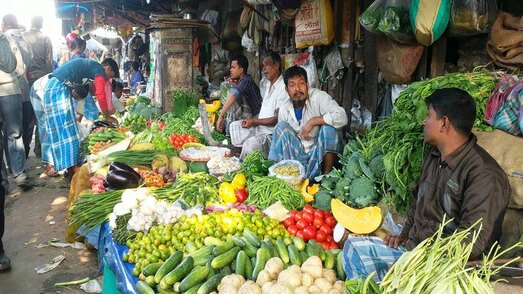 Inflated Prices of Produce Diminish Potential Buyers Inflated Prices of Produce Diminish Potential Buyers The sight of a poor man in front of a fruit shop is a rarity! I don’t deny that people belonging to lower economic ranges don’t eat veggies and fruits. They do consume, but the quantity and frequency don’t meet the required standards. A balanced diet is the right combination of fruits, vegetables, whole grains, dairy, lean meats and poultry in the appropriate quantities. Nutritionists and dietitians recommend that people fill half their plates with fruits and veggies with the other half being filled by the other food groups (proteins, dairy and whole grains). But sadly, people belonging to a lower socio-economic position (SEP) population prefer to eat foods that are lower in costs and greater in quantity. This makes us wonder whether social class does have an integral role in affecting diet quality. Nutrition & Diet The food that we eat plays a critical role in affecting the health of our body. We have got ample data that the difference in health quality of people is directly proportional to dietary factors. Diets rich in fruits, veggies and whole grains are high in nutrients such as vitamins and minerals and low in energy density, whereas diets rich in added sugars, refined grains and added fats are energy-dense but poor in nutrients. The difference in energy densities greatly predict obesity and metabolic syndrome rates. People belonging to the higher section of the society are observed to be fitter, healthy-weighted and habituated to eating nutritious foods compared to the lower SEP group who suffer greatly from increased risk of obesity, cardiovascular problems, type 2 diabetes, osteoporosis and certain forms of cancer. High energy foods rich in sugar and fats are available at a cheaper cost comparatively. These nourish the individual with empty calories making the person feel fuller for longer periods. Also, such foods are available cheaper and this makes people of lower socioeconomic status prefer them greatly. We don’t see a small kid living in a hut munching on some nuts or chewing away a carrot stick but only mostly witness him/her with a lollipop/cream bun in hand. An opportunity to exercise, purchase the required fitness gears, access relevant foods and knowledge about the same lack profusely in this section of the people. The quality of the food that we choose is not only dependent on the economic status but also on the occupation, education, age and sex of the individual. Understanding the barriers that exist in the society against adopting a healthy diet is crucial for minimizing the differences in diet quality. There are studies proving that nutritious foods cost more per calorie than energy dense foods that lack any nutrition. Variations in Diet According to Socio Economic Status There have been several studies that have taken up the relation between nutrient intake and socioeconomic status (SES), the impact SES creates on the types of foods individuals choose and the resulting differences in health of the individual. One such study focused on the different foods consumed by individuals belonging to high SES and low SES, and the results are tabulated below:
Higher SES groups consumed more of fruits and vegetables with great variety. Studies in European countries showed extreme difference in the consumption levels of produce between high SES groups and low SES groups, in Australia there was a 3-fold difference witnessed and in Netherlands women with lower education consumed fruits 3 times lesser than those who were more educated. US and UK showed great disparity in the consumption of fruits and vegetables while certain European countries have surprised us. Greece, Spain, Holland and Portugal showed that lower SES groups consumed more fruits and vegetables and domestically produced foods. The table also shows that lower SES groups consumed more fatty meats, fried/canned fish compared to higher SES groups who consumed more of lean meats, fish and seafoods.
Added sugars was again a problem in people belonging to the lower SES groups as they consumed more of cakes and sugar but even people belonging to higher SES groups ate more candies and pastries. In a nutshell, more of fruits, veggies, whole grains, lean meats and proteins were consumed by higher SES groups whereas fatty meats, added sugars, refined grains and fats were consumed by those in lower SES groups. Fiber & Nutrients: The study concluded that higher SES groups consumed more of fiber and micronutrients such as vitamins and minerals comparatively. Vitamin D, profoundly found in fatty fish was lacking commonly in lower SES groups and the dietary intakes of vitamin C, iron and folate were also insufficient in people belonging to the lower SES groups. Energy & Macronutrients: Proteins showed positive and negative associations for the SES groups, fats and carbohydrates showed no consistent SES gradient. Higher income and education were associated with a lower dietary energy density. Yet another study showed that substituting healthier foods increased expenses by 30-40% which is not affordable by many. Poor people cannot bear the risk associated with trying new foods and choose long-lasting ones that are likelier to contain more added sugars, fats and refined grains. HELIUS Study Four ethnic groups, Dutch, Surinamese, Turkish and Moroccan, were considered for the study and they were given ethnic-specific food frequency questionnaires (FFQs). The questionnaires included questions on the frequency and portion sizes of 200 different items consumed during previous months. The study observed that higher dietary costs were associated with higher dietary quality, the importance of dietary costs for dietary quality differed between socioeconomic and ethnic subgroups and also was able to derive the subgroups that were able to achieve maximized dietary quality at a low dietary cost. US studies showed that Mexican-Americans and Hispanics achieved higher dietary quality at lower costs; Moroccans, Turkish and South-Asian Surinamese origin individuals consumed nutritious diets compared to Dutch and African Surinamese origin people. Dutch individuals displayed lowest dietary quality despite higher education levels. Lower educated Moroccans expressed higher dietary quality. Though higher dietary costs were associated with higher dietary quality we also seem to witness the fact that lower dietary costs too sometimes lead to higher dietary quality. This makes us check out on the interaction between different resources, such as material resources, nutrition knowledge, accessibility and availability of food retailers, food costs, to dietary quality. For individuals belonging to lower income groups or lower education levels the price of quality foods can deter their goal of eating a healthy meal. The pricing of fruits, veggies and grains have peaked since the last couple of decades and this had burdened the common man greatly. Individuals think twice before buying milk, produce or even rice as to the quantity required and their shelf-life. The inclusion of various policies that target food pricing brining them to nominal levels affordable by the common man would be beneficial to individuals across different educational and ethnic backgrounds. Health initiatives to address nutritional disparities and bring in effective solutions is the need of the hour now. References Social Class predicts diet quality: https://academic.oup.com/ajcn/article/87/5/1107/4650128 Are Socioeconomic disparities in diet quality explained by diet cost? https://www.ncbi.nlm.nih.gov/pmc/articles/PMC3951975/ Ethnic differences in the relation between dietary cost and quality: https://nutritionj.biomedcentral.com/articles/10.1186/s12937-019-0445-3 Comments are closed.
|
AVOID FRAUD. EAT SMART+91 7846 800 800
|
- Home
- Written Testimonials
- Consult
- Clinics
- Blogs
-
Diet & Nutrition
- Diabetes Reversal
- IVF IUI not needed for PCOS PCOD Infertility
-
Medical Nutrition
>
-
Disease & Conditions
>
- Infertility | PCOS
- Diabetes Mellitus
- Cholesterol
- Hypothyroid
- Kidney Problems
- Hypertension
- Cardiovascular Diseases
- Liver Diseases
- Gastro intestinal disorder
- Cancer
- Metabolic Disorders
- Orthopedic Disorders
- Eating Disorders
- Dietary Recall
- Weight Record Filled By Clients
- Online Payment Transaction Details
- Online Clients Weight Check Form
- Our Program Package Service Charges
- Weight Record 2017 Clients
- Measurements sent by Clients
- Terms & Conditions Of Payment
- Thanks. Your Form is Submitted
- Video Testimonials
- Lifestyle & Wellness
- Lifestyle & Wellness Blog
- Allergy & Intolerance
- Weight Loss / Gain
- Weight Loss / Slimming Blog
-
Disease & Conditions
>
- Life Cycle Nutrition >
- Sports Nutrition >
- Integrity in Nutrition
- Knowledge Centre
© COPYRIGHT 2022. ALL RIGHTS RESERVED. FRST HEALTHCARE PVT LTD.
Dr. Nafeesa Imteyaz of First Eat Right clinic, is the Best Dietitian Nutritionist in Bangalore. Best Dietitian Nutritionist in Pune. Best Dietitian Nutritionist in Hyderabad. Best Dietitian Nutritionist in Chennai. Best Dietitian Nutritionist in Mumbai. Best Dietitian Nutritionist in Delhi. Best Dietitian Nutritionist in Kolkata.




